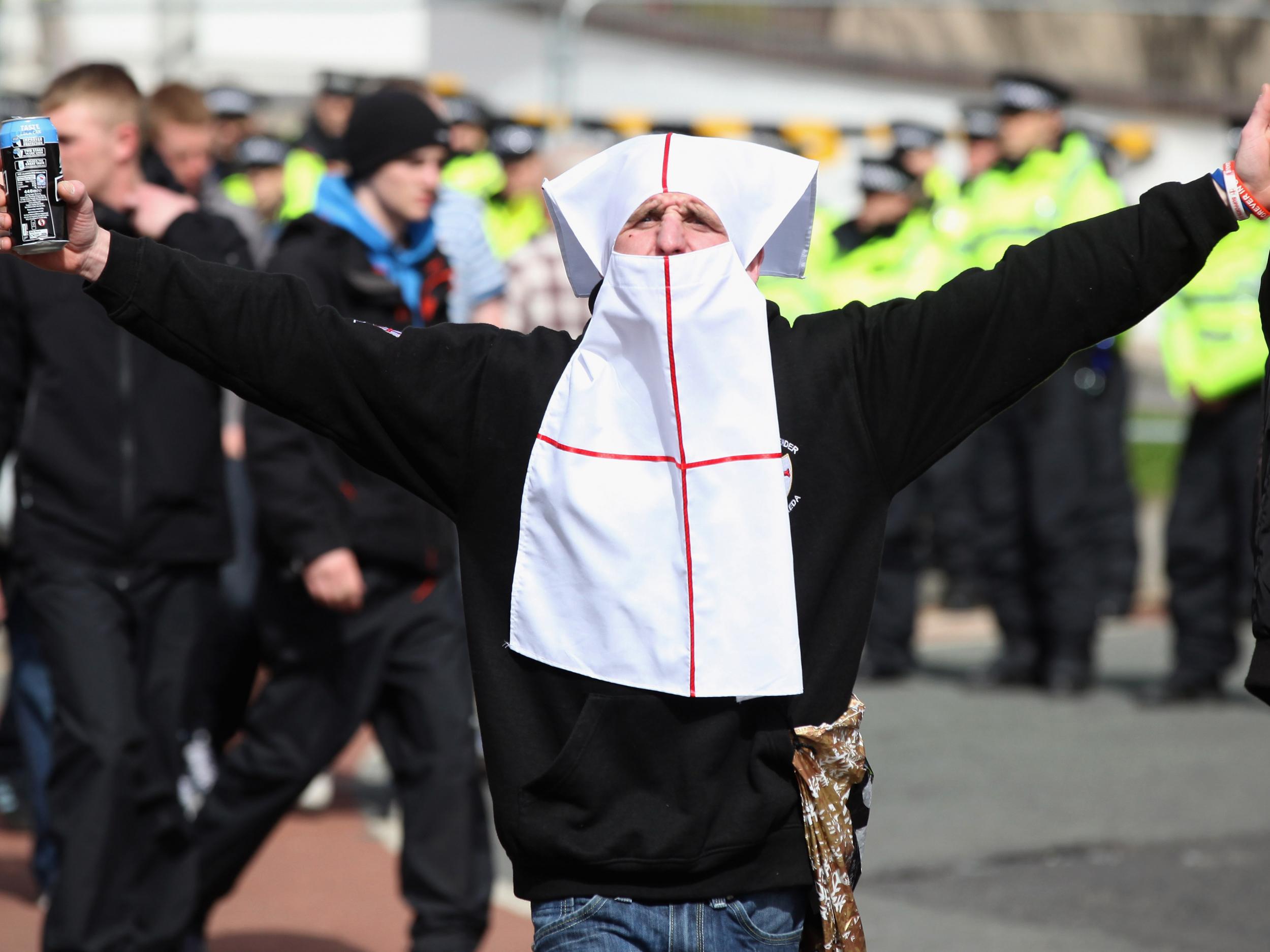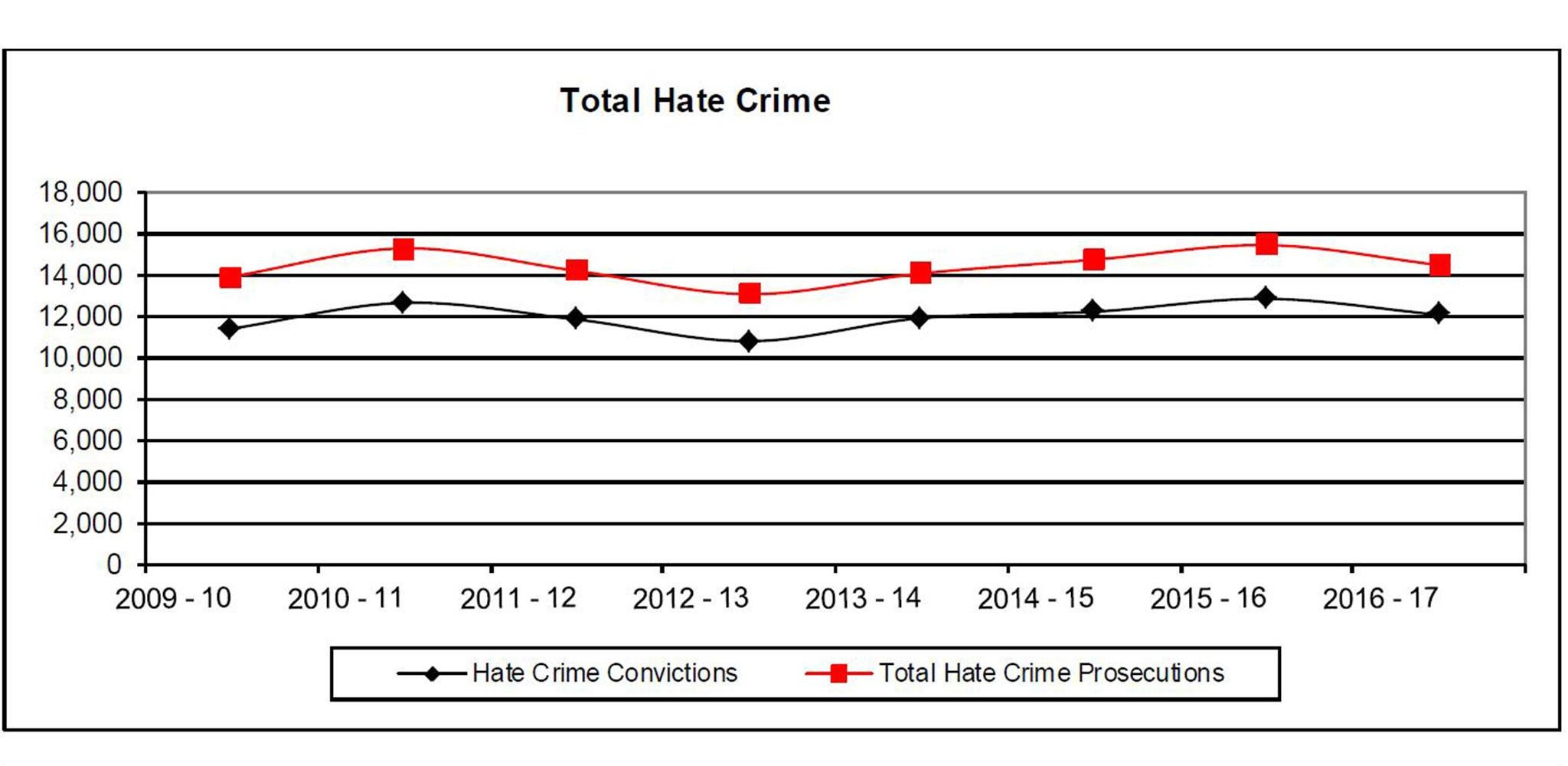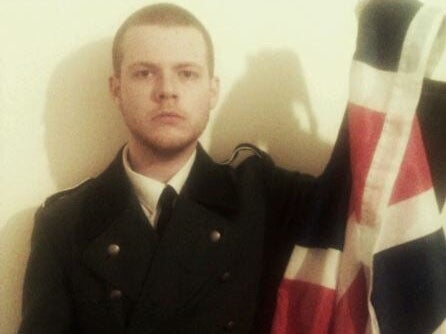Hate-crime prosecutions fall despite spike in reported attacks after Brexit referendum
Charity calls figures 'unacceptable' following record reports of antisemitic hate crime

The number of hate crimes prosecuted last year dropped despite a spike in reported attacks in the wake of the EU referendum, new figures show.
The Crown Prosecution Service (CPS) hailed an increase in the use of powers to increase prison sentences for offenders, but campaigners called the annual statistics “unacceptable”.
They showed that a total of 14,480 hate-crime prosecutions were completed across England and Wales in 2016-17, down by almost 1,000 from the previous year.
The dip has sparked questions about the treatment of offences motivated by a victim’s perceived race, religion, disability, sexual orientation or transgender identity after recent police figures indicated a steep rise surrounding Brexit.

CPS figures, which only cover prosecuted crimes, show small increase in the number of hate crime cases referred by police year-on year, from 12,997 to 13,086.
But the slight rise did not recover the gulf left by an almost 10 per cent drop the year before.
Alison Saunders, the director of public prosecutions, said: “The drop in referrals recorded last year has impacted on the number of completed prosecutions in 2016-17 and we are working with the police at a local and national level to understand the reasons for the overall fall in referrals in the past two years.”
She hailed the increasing use of powers to increase punishment for criminals motivated by prejudice, with the figures showing more than half of prison sentences “uplifted” – a record of more than 6,300 cases.
Ms Saunders said hate crime has a “corrosive effect” on society and would be punished to the fullest extent possible.
“We know hate crime is underreported and that is why we ran our recent #hatecrimematters campaign aimed at raising awareness of what hate crime is and what people can do about it,” she added.
But the Campaign Against Antisemitism called the number of prosecutions “paltry” in comparison with the record crime being reported by the Jewish community in Britain.

The group said its “chilling” polling showed that only 39 per cent of British Jews feel confident that antisemitic hate crimes against them would be prosecuted, 52 per cent believe that the CPS is doing too little to fight antisemitism and almost one in three considered leaving Britain in the past two years.
Stephen Silverman, the group’s director of investigations and enforcement, said: “While the CPS says that it is prosecuting hate crime ferociously, we have yet to see a single year in which more than a couple of dozen antisemitic hate crimes were prosecuted.
“So serious are the failures by the CPS to take action that we have had to privately prosecute antisemites ourselves and challenge the CPS through judicial reviews, the first of which we won in March.”
Jewish charity the Community Safety Trust has been working on CPS training alongside the Islamphobia tracking group Tell Mama and other specialist charities.
Rachel Almeida, the head of policy at Victim Support, said all types of hate crime have a “profound and destructive impact” on victims and their communities.
“As such we welcome that a record number of cases received a sentence uplift last year,” she said. “This provides justice for victims and sends a message that hate crimes are pernicious offences that are taken seriously.
“However, the fall in prosecutions is cause for concern and we urge the CPS to look at how to reverse this trend.”
The annual Hate Crime Report found that incidents have increased in the wake of terror attacks in the UK this year, but many of the cases are ongoing.

The number of hate crime convictions have fallen by 6 per cent to just over 12,000, although the rate was up slightly to 83 per cent.
Of the 2,400 unsuccessful prosecutions, just under a third saw the defendant found not guilty after trials and another third were due to “victim issues”, while others had the prosecution dropped.
The majority of hate-crime cases were for racially and religiously aggravated offences, making up 89 per cent of the total, followed by homophobic, biphobic or transphobic crimes (10 per cent) and then disability crimes, which accounted for a record of more than 1,000 prosecutions.
Nik Noone, chief executive of the LGBT anti-violence and abuse charity Galop said abuse was still a reality for many people in the community.
She said the CPS had “shown real commitment” and worked with the group on developing specialist policies and training.
“However, there is much more work still needed to ensure that all victims of hate crime can access justice and be sure of receiving respectful treatment in court,” Ms Noone added.
Stephen Brookes MBE, an ambassador for Disability Rights UK and coordinator of the Disability Hate Crime Network recently wrote to the Solicitor General on the “heinous crime”.
“It seems to be difficult to prove an offence is a disability hate crime under current legislation,” he warned.
“Additionally we still find that cases in which CPS disagreed with the police, and treated the offences as disability hate crime, the judiciary still frequently refuse to accept their responsibility and increase the sentence, proving that there are massive issues in the way both police and the judiciary charge disability hate crimes.”
Offences against the person, which encompass assaults and threats, and public order offences were the most common types of attacks.
Among those jailed are a man who waged an antisemitic online campaign against an MP, another man convicted over Islamophobic emails, one who called on his social media followers to kill Muslims, two defendants who carried out a homophobic assault and a man who pushed a transgender disabled woman in the path of an oncoming car.
The vast majority of defendants were men, with around 70 per cent of defendants were white, 7 per cent black and 5 per cent Asian, and between the ages of 25 and 59.
The CPS said most victims also fell into the same age category but there was not sufficient data on their ethnicity and gender to calculate accurate proportions.
Its report came at the start of National Hate Crime Awareness Week, which will see the conferences and events across the country bringing together police, local authorities and community groups to tackle issue.
Figures on the number of hate crime offences recorded by police for the full 12 months have not yet been published, with the latest figures due on Tuesday.
Bookmark popover
Removed from bookmarks